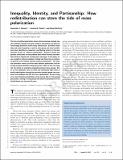Files in this item
Inequality, identity, and partisanship : how redistribution can stem the tide of mass polarization
Item metadata
| dc.contributor.author | Stewart, Alexander J. | |
| dc.contributor.author | Plotkin, Joshua | |
| dc.contributor.author | McCarty, Nolan | |
| dc.date.accessioned | 2022-06-14T09:40:30Z | |
| dc.date.available | 2022-06-14T09:40:30Z | |
| dc.date.issued | 2021-12-14 | |
| dc.identifier | 273522027 | |
| dc.identifier | 8b491e39-0507-4408-a335-fcfd9b20094f | |
| dc.identifier | 85121055414 | |
| dc.identifier | 000732715700007 | |
| dc.identifier.citation | Stewart , A J , Plotkin , J & McCarty , N 2021 , ' Inequality, identity, and partisanship : how redistribution can stem the tide of mass polarization ' , Proceedings of the National Academy of Sciences of the United States of America , vol. 118 , no. 50 , e2102140118 . https://doi.org/10.1073/pnas.2102140118 | en |
| dc.identifier.issn | 0027-8424 | |
| dc.identifier.other | ORCID: /0000-0001-5234-3871/work/104619490 | |
| dc.identifier.uri | https://hdl.handle.net/10023/25522 | |
| dc.description.abstract | The form of political polarization where citizens develop strongly negative attitudes toward out-party members and policies has become increasingly prominent across many democracies. Economic hardship and social inequality, as well as intergroup and racial conflict, have been identified as important contributing factors to this phenomenon known as “affective polarization.” Research shows that partisan animosities are exacerbated when these interests and identities become aligned with existing party cleavages. In this paper, we use a model of cultural evolution to study how these forces combine to generate and maintain affective political polarization. We show that economic events can drive both affective polarization and the sorting of group identities along party lines, which, in turn, can magnify the effects of underlying inequality between those groups. But, on a more optimistic note, we show that sufficiently high levels of wealth redistribution through the provision of public goods can counteract this feedback and limit the rise of polarization. We test some of our key theoretical predictions using survey data on intergroup polarization, sorting of racial groups, and affective polarization in the United States over the past 50 y. | |
| dc.format.extent | 9 | |
| dc.format.extent | 1940243 | |
| dc.language.iso | eng | |
| dc.relation.ispartof | Proceedings of the National Academy of Sciences of the United States of America | en |
| dc.subject | Polarization | en |
| dc.subject | Inequality | en |
| dc.subject | Cultural evolution | en |
| dc.subject | Risk aversion | en |
| dc.subject | HN Social history and conditions. Social problems. Social reform | en |
| dc.subject | JK Political institutions (United States) | en |
| dc.subject | QA Mathematics | en |
| dc.subject | T-NDAS | en |
| dc.subject | SDG 10 - Reduced Inequalities | en |
| dc.subject.lcc | HN | en |
| dc.subject.lcc | JK | en |
| dc.subject.lcc | QA | en |
| dc.title | Inequality, identity, and partisanship : how redistribution can stem the tide of mass polarization | en |
| dc.type | Journal article | en |
| dc.contributor.institution | University of St Andrews. Applied Mathematics | en |
| dc.identifier.doi | 10.1073/pnas.2102140118 | |
| dc.description.status | Peer reviewed | en |
| dc.date.embargoedUntil | 2022-06-14 | |
| dc.identifier.url | https://arxiv.org/abs/2103.14619 | en |
This item appears in the following Collection(s)
Items in the St Andrews Research Repository are protected by copyright, with all rights reserved, unless otherwise indicated.

